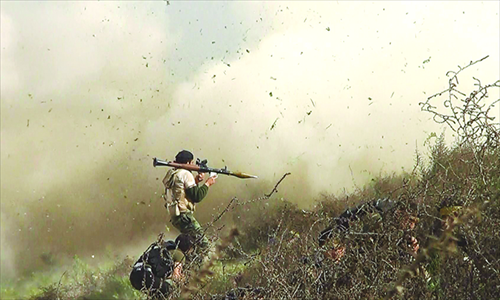HOME >> OP-ED
Countries opposed to Syria strike must speak out
Source:Global Times Published: 2013-8-29 0:28:01

An image grab taken from a video shows an opposition fighter holding a rocket propelled grenade launcher as his comrades take cover from an attack by regime forces on Monday during clashes over the strategic area of Khanasser, situated on the only road linking Aleppo to central Syria. Photo: AFP
US Secretary of State John Kerry declared on Monday that there was "undeniable" proof of last week's chemical weapons attack in Syria, and that the "moral obscenity" of the Bashar al-Assad administration "should shock the conscience of the world." Analysts pointed out that a US strike against Syria could come "as early as Thursday."
The so-called evidence claimed by Washington hasn't yet been backed by UN investigations. And looking at the US' record, it waged the Iraq War with false evidence. Nonetheless, if Washington is determined to bypass the UN and bomb Syria this time, no one will be able to stop it.
But it is set to be an unwarranted air strike which merely appears formidable. Without wide political support, it may become the most reluctant air strike since the Cold War.
The 1999 air war in Kosovo was clearly aimed at coercing Serbia's military withdrawal from Kosovo, and Washington succeeded. And in 2011, the West launched air strikes in Libya to aid the Libyan opposition in defeating the isolated Gaddafi administration. But this time, Washington lacks a clear political end goal. Citing "moral obscenity" as an excuse to gear up for military action seems rash and hasty.
The attack on Syria, if it takes place, will encounter unprecedentedly fierce resistance. The Assad government has firm support from Russia and Iran. And the tumbling "Arab Spring" in Egypt also gives the Assad government the confidence to survive external intervention.
While Washington is seeing declining clout worldwide, Russia's national strength is recovering and China's global influence is climbing. Although the two do not seek direct confrontation with the West, their warnings over the strike, which are increasingly hard to ignore, do rebuff Western endeavors to solicit support.
Worldwide forces that oppose military intervention should unite and prevent the Western attack on Syria. If the strike takes place, they should openly support the resistance by the Syrian government. It is necessary for Russia and Iran to consider providing direct military aid. As key stakeholders in the Syrian dynamic, the two have no other choice but to firmly oppose military intervention in Syria.
China is unlikely to play a leading role in the Syria issue, but China must express its attitude on the Western strike more clearly than ever. The ensuing strategic benefit is important for Beijing, especially given the fact that the West is gradually targeting China as the "biggest potential threat." For China, the Syrian crisis will not change its strategic relations with the West, but will help consolidate trust from some other countries.
When it comes to strikes against small countries, Washington is more hesitant than two decades ago. The world should continue to pressure Washington and push it toward a position where it shrinks back from overwhelming odds. This is very important for the strategic security of emerging countries.
Posted in: Observer